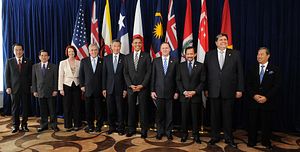Over the past decades, Vietnam has taken a proactive approach to international integration and globalization. Since 2011, Vietnam has successfully negotiated a number of free-trade agreements (FTAs), such as the Trans-Pacific Partnership (TPP), EU-Vietnam FTA, Vietnam-Korea FTA, and Vietnam-Eurasian Economic Union (consisting of Russia, Belarus, Kazakhstan, Armenia, and Kyrgyzstan) FTA, not to mention other regional cooperation efforts such as the ASEAN Economic Community. The integration strategy has been confirmed by the Communist Party of Vietnam in its Resolution on International Economic Integration adopted in early November 2016.
Studies have shown that, if TPP is implemented, Vietnam will be biggest winner of this trade pact. Under the deal, Vietnamese exporters will have greater access to larger, dynamic, and fast-growing TPP markets, which are home to more than 792 million people and account for 40 percent of world trade. Additionally, TPP would improve Vietnam’s competitiveness on the global market by solidifying its participation in lucrative trading blocs. The government also reported that, according to the World Bank, Vietnam would receive the most benefits among the 12 TPP members in terms of GDP and export growth. It is estimated that by 2030, TPP would add 10 percent to Vietnam’s GDP growth and boost exports by 30 percent.
However, the newly elected president of the United States, Donald Trump, has declared his intention to withdraw from the TPP. According to the terms of the agreement, at least six of the 12 members, which together must account for at least 85 percent of the combined GDP of all members (in 2013), must ratify the agreement in order for TPP to take effect. Since the U.S accounts for more than 58 percent of the 12 members’ combined GDP, its withdrawal will kill TPP.
Even TPP does not come into effect, however, the negotiation and signing of this FTA still benefits Vietnam in several ways.
First, TPP has provided momentum for domestic reforms in both economic structure and legislation. Many pieces of legislation have been put on the agenda of the National Assembly to bring domestic law into conformity with the requirements of the TPP. For example, new laws on foreign trade and promoting small and medium enterprises are being drafted, and the Labor Code and other regulations on business conditions are being revised. These bills are scheduled to be adopted within the next two years before TPP was supposed to take effect.
Second, TPP provided an incentive to improve the competitiveness of enterprises. Many enterprises of Vietnam’s key export industries such as textiles and garments, footwear, seafood, wood furniture, and agricultural products have already been preparing themselves for the implementation of TPP. This preparation will improve their competitiveness even if TPP never takes effect.
Third, TPP raised the awareness of state officials, employers, trade unions, workers, and the public regarding Vietnam’s economic integration strategy as well as the implications of FTAs. There have been campaigns launched to disseminate information on the TPP for government officials, businesses, and trade unions. At the same time, Vietnamese scholars have taken on a lot of research on TPP.
While there are still some benefits for Vietnam, the failure of TPP would mean a huge loss in many senses. It would undercut economic and trade benefits, which may, in turn, have negative impacts on future domestic economic structural reform and Vietnam’s development. Vietnam would also lose the chance to play a role in setting rules at a global level, and would see a reduced opportunity for closer ties with the West (the United States in particular). Finally, the death of TPP forces Vietnam to be more dependent on new economic deals set up and initiated by China.
Nonetheless, the reforms and preparation launched by TPP will still improve Vietnam’s domestic business environment and competitiveness. Furthermore, making domestic reforms to meet the high standards set down by the TPP will enable Vietnam to implement and benefit from the 10 FTAs already in effect, as well as any future FTAs. More importantly, with its unique geopolitical position, Vietnam will continue to play a crucial role for U.S. strategy in the region. Vietnam’s experience in the TPP has shown its active economic integration policies and strong commitment to reforms, which clearly signal the opportunity for other multilateral FTAs or a bilateral FTA with the United States in the future.
Dr. Nghia Trong Pham is a Global Leaders Fellow at the Global Economic Governance Program, University College and the Blavatnik School of Government at Oxford University. Nighia has held positions in Vietnam’s Ministry of Labor and National Assembly Office, and participated in the Trans -Pacific Partnership (TPP) negotiations as a member of the Vietnam Labor Team.

































